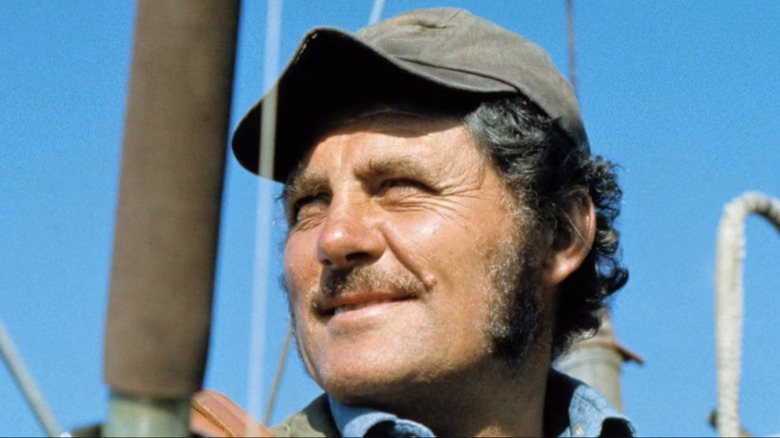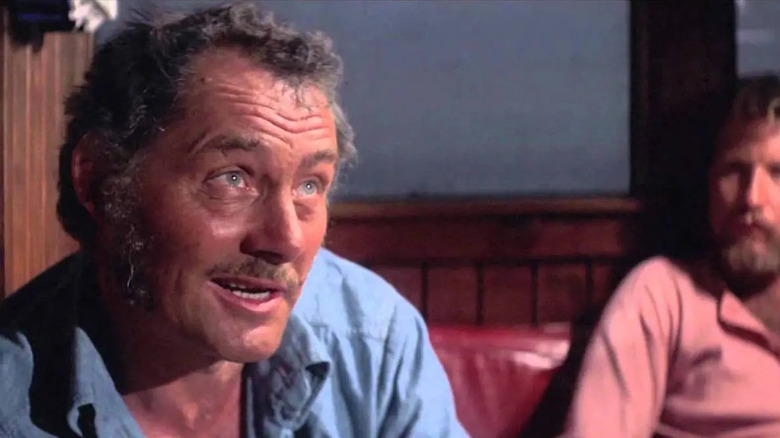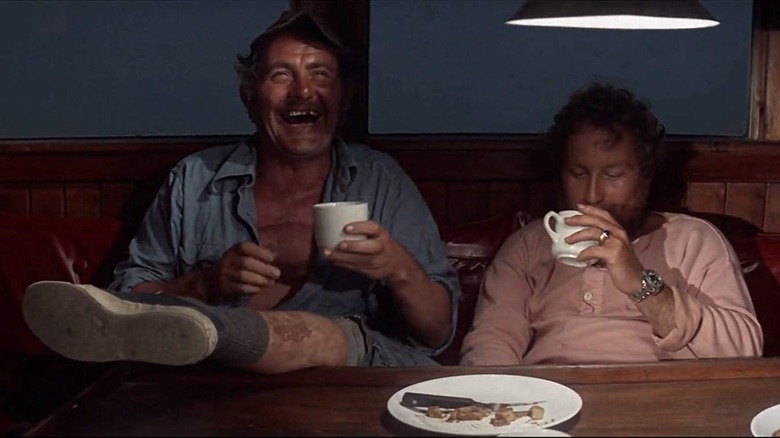Jaws Features One Of The Greatest Scenes Of All Time — And We'll Never Know For Sure Who Wrote It
"Jaws" was released in June of 1975, and the very fact that we're still passionately, eagerly discussing the movie decades later for its 50th anniversary says a lot about its impact, value, and staying power. In addition to just how damn good the film itself is, there's so much lore and debate that surrounds it to this day. One question that often comes up is a deceptively simple one: what's the scariest scene or moment in the movie? Some will say the opening sequence, others the various attacks by the Great White on crowded public beaches in the middle of a sunny summer day. For my money, however, no moment in "Jaws" is more richly disturbing than a setpiece we don't actually get to see: the sinking of the U.S.S. Indianapolis in 1945, in which the few survivors of the World War II skirmish found themselves wading in shark-infested waters with no hope of rescue.
That moment, a fictionalized version of an actual incident, may not be visualized in a literal sense, but a vibrant picture is painted nonetheless thanks to the performance of actor Robert Shaw, who plays the shark hunter Quint. It's a scene that packs a wallop within a movie that is suffused with indelible moments and characters. Heck, the monologue isn't even the only standout bit of Shaw's performance alone — one could also single out Quint's introductory monologue, wherein he boasts about capturing and killing the shark which has been terrorizing the citizens of Amity Island. Then there's the lovely bonding scene between Quint, Matt Hooper (Richard Dreyfuss), and Martin Brody (Roy Scheider), where the disparate men find some common ground with each other through comparing their various scars and wounds.
Yet it's the speech that follows that moment of camaraderie, which acts as a brilliant centerpiece to the entire scene that revitalizes the life-or-death stakes of the men's mission, and sums up Quint's character that nearly steals the entire movie. Ironically — or perhaps fittingly — the monologue is an honest-to-goodness magic moment, for while Shaw, director Steven Spielberg, and the other cast and crew's contributions to it are generally plainly seen, it remains a mystery (and a bit of a controversy) to date as to who actually authored the speech.
The controversy over the Indianapolis speech
Any cursory study of the making of "Jaws" reveals how the film came together due to the efforts of a ton of talented people at the behest of a beleaguered production. Thanks to so many elements going wrong during shooting (chief among them was, most famously, the mechanical shark), Spielberg and his cast and crew had to pull things together in a hurry. This is likely the primary reason why the authorship of the Indianapolis speech turned into an evergreen debate, as everyone was so distracted and busy that no one had time to document exactly who did what and when at every turn.
As the story goes, thanks to an interview Spielberg gave in 2011 (along with various other interviews from behind-the-scenes featurettes and documentaries), playwright Howard Sackler came up with the idea for the monologue. Sackler is one of several uncredited writers on "Jaws" — the screenplay is primarily credited to Peter Benchley (who penned the source novel) and Carl Gottlieb. As Spielberg said:
"I had never heard of the Indianapolis before Howard ... Howard one day said, 'Quint needs some motivation to show all of us what made him the way he is and I think it's this Indianapolis incident.' I said, 'Howard, what's that?' And he explained the whole incident of the Indianapolis and the Atomic Bomb being delivered and on its way back it was sunk by a submarine and sharks surrounded the helpless sailors who had been cast adrift and it was just a horrendous piece of World War II history. Howard didn't write it as a long speech, he probably wrote about three-quarters of a page."
Spielberg then went on to say that another uncredited writer, his friend and filmmaking colleague John Milius, took Sackler's material and wrote "a 10-page monologue" version of it. Then, seeing that it was too long, Spielberg simply had Shaw shorten it before shooting. However, in another interview, Gottlieb contends that Shaw didn't merely edit the speech, but that he wrote it entirely. Gottlieb claims that there were numerous versions of the speech in contention, including drafts from Spielberg proteges Robert Zemeckis and Bob Gale as well as himself, but that Shaw (a playwright in his own right) actually did the final version. As Gottlieb explained:
"So, [Shaw] took it all, synthesized it. And one night while we are all at dinner ... he came in with a handful of paper and said, 'I think I have the pesky speech licked,'" Gottlieb recalled. "And he basically performed it for the table. And we all went, 'Wow.' And Steven said, 'That's what we're shooting.'"
How the Indianapolis speech as we know it nearly didn't make it before cameras
There's an additional wrinkle to these competing recollections, however, and it's that the Indianapolis speech was not shot once, but twice, over two separate filming days. The reason for this is that Shaw, for Method acting reasons (and perhaps reasons relating to his alcoholism), pitched an idea to Spielberg for the first take, which didn't go so well. As Spielberg recalled:
"The first time we attempted to shoot it Robert came over to me and said, 'You know, Steven, all three of these characters have been drinking and I think I could do a much better job in this speech if you actually let me have a few drinks before I do the speech.' And I unwisely gave him permission ... I had two cameras on the scene and we never got through the scene, he was just too far gone."
The next morning, Shaw allegedly called Spielberg and asked to reshoot the speech, sober this time, and Spielberg happily agreed, saying that the reshoot only took four takes and "it was like watching Olivier on stage." Given these circumstances, it's incredibly likely that Shaw wasn't delivering a word-perfect version of the speech, and he'd clearly been working on it after he'd felt he botched the first attempt. So, as Shaw's son Ian (co-author and star of "The Shark Is Broken," the successful stage play about the making of "Jaws") contends, the final version of the speech is "Robert's rewrite ... but Robert didn't write it completely on his own," and believes credit should also go to Sackler and Milius for their various contributions to it.
While this sounds like the closest version of the truth — it's certainly the most diplomatic — it ultimately doesn't matter. Whether he had a heavy hand in its writing or not, Shaw's delivery of the monologue makes it one of the most indelible moments in cinema history. If we're going to be diplomatic, we should give credit to pretty much everyone involved with the making of "Jaws": after all, it's possible Shaw wouldn't be as good in the scene without his co-stars, without Spielberg's direction and composition, without Benchley's source novel, and so on. It's a moment that exists thanks to the collaborative medium that is movie-making, an art form which is made via the totality of contributions from individuals, no matter how large or small.
Anyway, Shaw delivered the monologue, and history took the rest, June the 20th, 1975.


